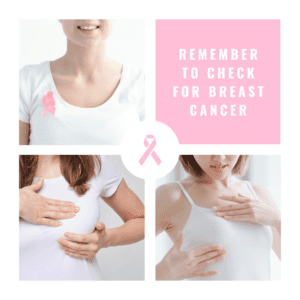Providing Support and Raising Awareness of Breast Cancer
In their lifetime, 1 in 7 UK females will be diagnosed with breast cancer.
October is Breast Cancer Awareness Month, a time to promote awareness and show support for those affected.
In this blog post, we’ll explore what breast cancer is, symptoms to look out for, how to reduce your risk, and how to support someone who is going through it.
What is breast cancer?
Breast cancer is a type of cancer that starts in the cells of the breast. It occurs when abnormal cells in the breast tissue grow out of control and form a tumour. Breast cancer can be invasive or non-invasive; invasive breast cancer means that the cancer cells have spread from the original tumour into surrounding tissue, and non-invasive breast cancer means that the cancer cells have not spread beyond the original tumour.
Breast cancer is the most common cancer in the UK, with 1 woman diagnosed every 10 minutes. It can occasionally also occur in men, although this is much less common. Around 55,000 women and 400 men are diagnosed with breast cancer every year in the UK.

What is Breast Cancer Awareness Day?
October is Breast Cancer Awareness Month, and 20th October marks International Breast Cancer Awareness Day; an annual event to increase awareness and understanding of breast cancer among individuals and organisations. The day serves to raise awareness about the importance of early detection and the treatment options and support services available for those living with or affected by breast cancer.
What are the symptoms of breast cancer and how do I check for them?
Self-examination is an important way to detect any changes in your breasts that could indicate the presence of breast cancer, yet over a third (39%) of women in the UK do not check their breasts regularly.
Common signs and symptoms are:
- A lump or swelling in the breast, upper chest or armpit. You might feel the lump, but not see it.
- Changes in the size or shape of the breast.
- A change in skin texture i.e., puckering or dimpling of the skin.
- A change in the colour of the breast – the breast may look red or inflamed.
- Rash, crusting or changes to the nipple.
- Any unusual discharge from either nipple.
As the signs and symptoms of breast cancer can vary, if you notice any changes during your self-examination or experience any other symptoms that are unusual for you, it’s important to see your doctor as soon as possible for further evaluation.
Learn about the signs and symptoms of breast cancer and guidance on how to accurately check yourself and how often you should be doing it.

What causes breast cancer?
The exact cause of breast cancer is not known. However, certain factors such as age, family history, genetic mutations, obesity, alcohol consumption, smoking, radiation exposure, hormone therapy and lack of physical activity can increase a person’s risk for developing breast cancer.
Research shows that 8% of cases are caused by obesity, 8% of cases are caused by drinking alcohol, and 1% of cases are caused by ionising radiation.
How can I reduce my risk of breast cancer?
23% of breast cancer cases are , and fortunately, there are steps you can take to reduce your risk of developing it.
These steps include maintaining a healthy weight and exercising regularly; limiting alcohol consumption; avoiding smoking; eating a healthy diet rich in fruits and vegetables; getting regular breast screenings; and avoiding unnecessary radiation exposure.

How can workplaces raise awareness of breast cancer?
Organisations can implement the following approaches to increase awareness of breast cancer and help employees prioritise their health.
Promote self-examinations
Encourage employees to perform regular breast self-examinations and provide educational materials highlighting the proper technique. This could include distributing leaflets, or simply signposting them to specific resources such as Breast Cancer Now.
Provide informative resources
Place posters and infographics about breast cancer awareness in common areas such as break rooms and bathrooms or on bulletin boards. Ensure the materials include information on risk factors, symptoms and steps for early detection.
Host educational workshops
Organise informative sessions or workshops on breast cancer awareness, prevention, early detection and treatment options. Invite healthcare professionals or breast cancer survivors to speak and share their personal experiences.
Offer flexible working
Provide flexible work hours or paid time off for employees to attend breast screenings, appointments or support groups. This helps demonstrate that you prioritise their health, encourages them to do the same and reinforces a workplace culture that supports wellness.
Offer wellness programmes
Incorporate wellness programmes that focus on helping your employees develop healthy lifestyle habits. Emphasise how practices such as regular exercise, healthy eating and stress management can reduce the risk of breast cancer and promote overall wellbeing.
Workplaces play a vital role in raising breast cancer awareness, and by implementing these initiatives, you can foster a supportive culture and encourage employees to prioritise their health and wellbeing.



How can workplaces and colleagues support someone going through breast cancer?
When someone is diagnosed with an illness, it can be a difficult time for the individual and their workplace, and it is essential that employers provide support for managers and employees who are dealing with this situation. There are several ways they can do this:
Provide staff training
Staff training will ensure managers and colleagues understand the physical, emotional and mental health impact that a diagnosis of breast cancer can have, the potential effects of the disease and how best to support employees who are going through it.
Cancer and cancer treatment can affect an employee’s performance at work, so it’s important to be flexible in accommodating any adjustments required or additional support needs that may arise. Your occupational health provider can offer guidance on workplace adjustments and how to best support employees with a cancer diagnosis.
Provide flexible working
As well as enabling them to attend medical appointments without having to take unpaid time off, flexible working arrangements can help to reduce stress and fatigue for employees. Flexible working could include allowing employees to adjust their hours or work from home when needed.
Offer paid leave for medical appointments and recovery
Providing paid leave for medical appointments or recovery time will ensure that employees are not financially burdened when taking care of their health. This could include offering a specific amount of paid leave for medical appointments or providing additional sick days.
Provide access to resources and support
Having a strong support system is crucial to maintain wellbeing and reduce feelings of isolation while going through cancer. It’s important to provide employees with access and signposting to breast cancer resources, such as information, support groups or organisations who can offer emotional and practical support, as well as advice on treatment options. Consider offering an employee assistance programme (EAP) that provides access to professional counselling and other resources that can help employees manage the emotional and mental impacts of breast cancer.
Create a supportive environment
It is important to create a workplace atmosphere that encourages open and honest dialogue regarding breast cancer and gives employees the chance to ask questions and share their stories. Doing so will help foster a culture of support and emphasise the importance of employee health and wellbeing.
Breast Cancer Awareness Resources




In support of Breast Cancer Now, Medigold will be getting our barbie on and wearing pink on October 20th to raise awareness of the cause! If you’d like to join us and show your support, visit Breast Cancer Now’s website for more information.
Alternatively, if you need help or advice on how to prioritise your employee’s health and wellbeing after a breast cancer diagnosis, contact us here.
Disclaimer: The information provided in this blog is for educational and informational purposes only and is not intended as a substitute for professional medical advice. Always consult a healthcare professional for personalised advice regarding your health and wellbeing.
The Latest from our Blog…
Check out our blog for all of the latest news, events and updates from Medigold Health.
-

Highlights from our 2026 Occupational Health Technician Conference!
At the end of January, we proudly hosted our annual Occupational Health Technician (OHT) Training Conference – two full days dedicated to professional development, shared learning and strengthening the exceptional clinical standards that define Medigold Health. Bringing together colleagues from across the country, the event really showcased the breadth of[...]
Read More -

Reasonable Adjustments Series: Autism
Welcome to the next blog in our Reasonable Adjustments Series! This series explores how small changes can make the workplace more inclusive and productive for everyone. But first – what are reasonable adjustments? Simply put, they’re practical changes, backed by the Equality Act 2010, that remove barriers and make work[...]
Read More -

Can employees refuse a drug and/or alcohol test?
It’s a question we hear a lot: can an employee say no to a drug or alcohol test at work? Whether testing is being considered after an incident, as part of a routine programme, or because there are concerns about someone’s behaviour, a workplace drug or alcohol test can feel uncomfortable for[...]
Read More





